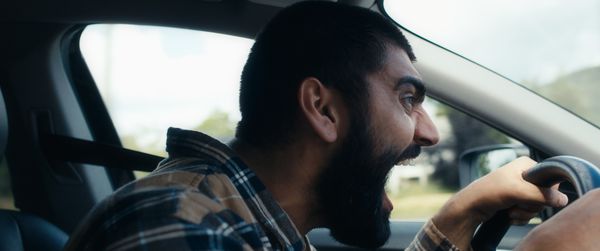Eye For Film >> Movies >> Above The Knee (2024) Film Review
Above The Knee
Reviewed by: Jennie Kermode

Body integrity disorder (BID) – the desire that some people experience to amputate apparently normal, healthy limbs, or to permanently impair their own senses – is something which seems to have an unusually intense power to inspire distress in others. Observing the way that cinema audiences respond, it’s clearly not just about the gore – similar things are done to non-consenting characters by villains and monsters all the time, without prompting anything like the same intense emotional response. Rather, the horror would seem to be something deeper and more fundamental – perhaps to stem from a clash of perspectives which reminds us that we can experience our humanity in very different ways, and that what might seem to be very basic aspects of identity might not be that secure after all. In this astutely balanced and sensitive film, Viljar Bøe explores this subject in a way that encompasses that horror but also succeeds in going beyond it.
It opens with an image of a cliff: old, weathered rock, layered and rounded, reminiscent of the striations in a piece of meat. Close by it lies a bloodstained rock. From here on, we will see intermittent subtitles counting down the days until the ‘accident’.

Next up is what turns out to be a flashback. Amir (Freddy Singh) straps a tourniquet around his left thigh, swigs from a bottle of what looks like vodka and then picks up a saw and begins pressing it down into his flesh.
This – and intermittent remembered images of blood on a polished wooden floor – are pretty much all that Bøe shows us directly, but the effect is still powerful, especially as his trademark use of brightly lit, stark, white-walled spaces gives the impression that we will be expected to take everything as it comes. He doesn’t let us look away from Amir’s social discomfort, which grows increasingly more acute over the course of the film. That early attempt at cutting off his offending leg has been misunderstood. As a consequence, he has nobody to talk to. When he watches a documentary about it with his girlfriend Kim (Julie Abrahamsen), she expresses revulsion at the idea. Desperate, he looks up a woman featured in the documentary, pretends to be a journalist, and contacts her for an interview – but it’s a connection that will lead him into still more dangerous waters.
Although Jonas describes his leg as rotting, we get only the briefest hints of what this looks like to him. For the most part, it just looks like an ordinary leg, and our understanding of his position comes from Singh’s performance. It’s there in the pain and stress in his face; in the slightly odd way he moves, as if he doesn’t have quite as much control over his left leg, as though it’s slower to respond to instructions. One study has shown that at least some people with BID have reduced grey matter in the superior parietal lobule of the brain that relates to the affected limb, suggesting that there may be a neurological explanation. This could make treatment difficult. Kim suggests that wanting to be disabled is offensive to genuinely disabled people – but the extent to which Amir’s distress interferes with his life would meet many definitions of a disability. Sometimes he slips away into a secret room so he can sit in a wheelchair with his leg folded up underneath his body and experience some relief.
Would Kim still love him if she knew the truth? Could she ever understand? These questions are just as important in the film as that of how far Amir will go to be at peace with his body. It’s one thing to deal with BID, another to deal with the concomitant social pressures alongside it – and yet disability frequently has consequences which extend beyond the individual. The real difficulty is that from his position, Amir’s desire to be rid of his leg is completely rational, just as, from that of people who care about him and have no equivalent experience, stopping him is rational. The absolute disconnect between these two positions is what powers the film and gives it a depth of tragedy much more potent than mere shock tactics.
Reviewed on: 01 Oct 2024















